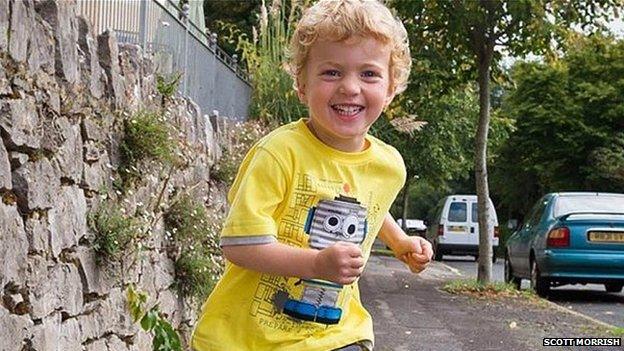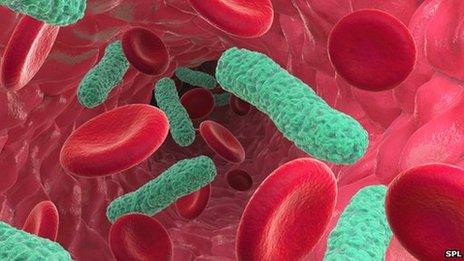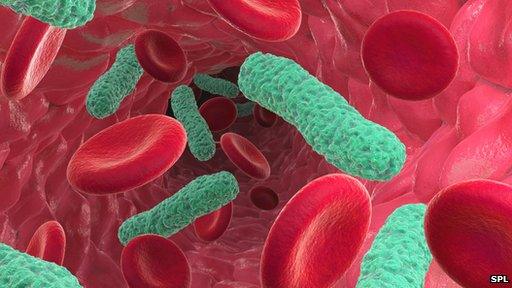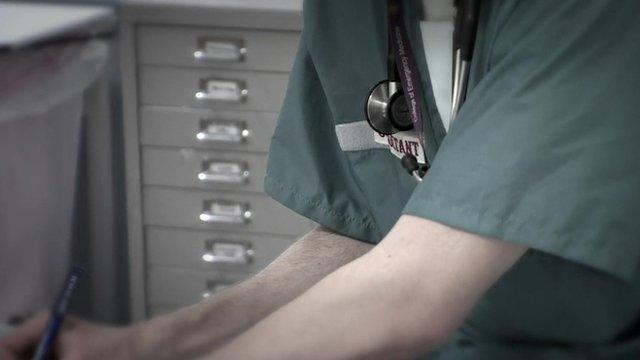NHS blunders led to Devon toddler's death
- Published

Sam Morrish died after a "catalogue of errors"
A string of blunders by NHS workers led to the death of a three-year-old Devon boy, a review has found.
Sam Morrish died in December 2010 from a treatable condition because four health service organisations made mistakes, the Parliamentary Health Service Ombudsman (PHSO) said.
He died of severe sepsis after a "catalogue of errors".
Sam's parents also said they had "serious concerns about the competence and accountability" of the ombudsman.
Ombudsman Dame Julie Mellor said that had Sam received the appropriate care, he would still be alive today.
Cricketfield GP Surgery, NHS Direct, Devon Doctors Ltd and South Devon NHS Trust were all criticised.
Failures included inadequate assessment of the toddler, not recognising that he was vomiting blood and a three-hour delay before he received antibiotics at hospital.


Facts about sepsis
Sepsis is a more common reason for hospital admission than heart attack - and has a higher mortality
The most common causes of severe sepsis are pneumonia, bowel perforation, urinary infection, and severe skin infections
The most common signs of sepsis are a high fever, violent shivering, fainting, cold and pale hands, rapid breathing, confusion or delirium
37,000 people are estimated to die of sepsis each year in the UK
From the time sepsis first takes hold, healthcare workers have just hours to deliver the right care
Source: UK Sepsis Trust, external

'Factual errors'
His family said as well as losing their son, they feel they have been "failed" by the NHS complaints system.
In a statement released through the Patients Association, they also criticised the ombudsman.
"The astonishing length of time it has taken for PHSO to finalise this report has inescapably prolonged our distress.
"Although we are grateful that the PHSO has upheld our complaints... we are left with serious concerns about the competence, capability and accountability of the PHSO itself."
Sam's mother Susannah Morrish said: "The report looks the way it does because of our constant intervention.
"The fact there had to be two draft reports, both of which looked radically different to this final report, says something.
"Our involvement included providing information, pointing out omissions, correcting factual errors.
"Our thoughts were if we didn't do this, who would?"
Sam's father Scott Morrish said: "The thing that we're still trying to push for is, we're not clear who the ombudsman is accountable to, we're not clear who really understands what happens behind the scenes there, and we're not entirely sure that Parliament is actually able to look at anything more than what comes out in the report."
Dame Julie said: "I accept that the family are right that the investigation method used in this case was not adequate to the complexity of the case.
"I really recognise that this contributed to the family's distress and we have apologised for that and thanked the family for their feedback on the particular method we used in this case, because we are developing new investigation methods."
Dame Julie said that Sam's devastated family suffered "further injustice" because health officials failed to properly investigate the youngster's death.
"But this case has to be looked at in the context of taking on over 4,000 cases to investigate every year, and receiving very few complaints about the quality of our decision making.
Susannah and Scott Morrish talk of the fight for the truth about their son's death
"When we do, we treat it like gold dust to help us improve our service.
"We've published this case so that the wider NHS learns from Sam's death," she added.
NHS England was ordered to pay £20,000 to the family.
Mr Morrish said: "The irony is we never wanted to lodge a formal complaint.
"We only did because we were advised to by the Patients Association in response to the NHS completely getting it wrong, not once, but twice.
"We didn't want it to be about blame, we wanted it to result in good learning."


Key recommendations
Cricketfield Surgery should train reception staff in directing patients through telephone triage system
NHS England should review out-of-hours guidelines and ensure other NHS organisations regularly test their own procedures
South Devon and Torbay Clinical Care Groups (CCGs), Northern, Eastern and Western Devon CCG and South Devon NHS Trust should provide bereavement services to families such as the Morrishes
Staff should be trained in bereavement services
South Devon and Torbay CCG and Northern, Eastern and Western Devon CCG should develop procedures for investigating serious incidents
Within three months, there should be people at the organisations trained to investigate serious incidents
The Morrishes should be paid £20,000

Dr Graham Lockerbie, speaking on behalf of the local NHS, said: "Sam died when he should have survived."
"We all accept the blame for that. Quite simply, we should have done better.
"When we investigated, we were still unable to provide adequate answers to Mr and Mrs Morrish about what had gone wrong, or to reassure them that things would change for the future. It is clear that this only compounded their grief.
"Again, on behalf of the local NHS, I apologise."
- Published12 September 2013

- Published12 September 2013
